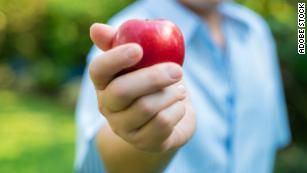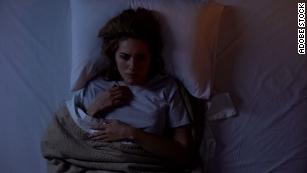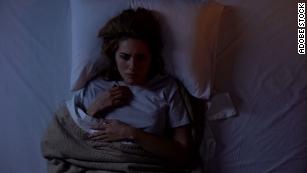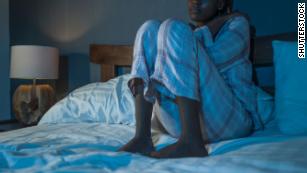Article Source – CNN
Sleep starts, also known as hypnic jerks or myoclonic jerks, are sudden involuntary muscle contractions that occur as you fall asleep. They can feel like a sudden jolt or “hiccup” and are usually accompanied by a sensation of falling.

It is a sudden, involuntary muscle contraction that occurs as you are falling asleep. The sensation of falling is a common symptom of a hypnic jerk.
Ever fall asleep and then wake up with a start?
Some people report being jolted awake by a loud snapping noise or a dazzling light originating from inside their head, while others report their muscles twitching involuntarily as a result of a quick electric shock.
“Sleep normally begins with a violent jerk that moves most of your body, with the arms and legs being the most likely to be impacted.
This can startle you awake before you have a chance to fall asleep “Dr. Raj Dasgupta, associate professor of clinical medicine at the University of Southern California’s Keck School of Medicine, is a specialist.
Chris Breitigan, a 29-year-old podcast creator from Huron, Ohio, claims that he occasionally has a ghostly awakening.
He claimed, “Just as I’m about to nod off, it’ll feel like someone tickles me.
“It originates in my back and descends into my legs.
I jolt up and feel something twitch in my body.”
According to experts, the experience may be accompanied by a quick heartbeat, faster breathing, perspiration, or a vivid dream or hallucination.
According to Dasgupta, sleep starts, also known as “hypnic jerks,” are common events that can affect both men and women of any age and are normally nothing to be concerned about.
Around 70% of people, according to estimates, start sleeping at some time in their lives, he said.
“According to medical terminology, hypnic jerks are a subtype of myoclonus, which is a term for quick, uncontrollable muscular movements.
Hiccups are a well-known manifestation of myoclonus.”
Although the exact cause of bodily twitches during sleep is unknown, experts speculate that high caffeine intake and mental or emotional stress may make them more frequent.

Fatigue or lack of sleep “may also facilitate them,” Dasgupta added.
Nonetheless, in healthy individuals, the majority of hypnic jerks occur virtually at random.
Breitigan usually has trouble falling asleep after a Taco Tuesday night out with pals.
He admitted, “I really don’t drink much.
“But, I go out with pals on Tuesdays, and we enjoy some cocktails and tacos.
As a result, since I don’t drink frequently, it appears that alcohol triggers it for me.”
Related Article - Long life comes from eating right, studies say. Here's how to begin
When to be concerned
According to Dasguta, there is no cure for sleep beginnings, and they are usually not harmful.
But if you encounter any of the following signs, you should see a doctor right away: several muscular jerks during the day, an injury brought on by hypnic jerks, biting your tongue or mouth while you sleep, or wetting the bed.
Hypnic jerks can occasionally be mistaken for seizures, according to Dasgupta.
“Despite their apparent similarity, they differ significantly in several important ways:
A dangerous occurrence, seizures may be brought on by an underlying ailment.
On the other hand, hypnic jerks are benign phenomena unrelated to any medical issues or worries, the doctor explained.
Generally speaking, they are bothersome, especially if they continually keep you from going to sleep.

Yet, he continued, some people become fixated on these startles from sleep, which raises their anxiety levels in relation to the upsetting experience.
It creates a vicious cycle of sleeplessness and sleep deprivation since “this heightened worry and exhaustion enhances the risk of suffering these jerks,” according to Dasgupta.
Stress, fatigue, and too much caffeine may trigger sleep starts, experts say.
Try these Restorations
Sleep Cycle Maintain – Dasgupta offers the following advice for anyone troubled by such occurrences:
Reduce caffeine intake:
Dasgupta claimed that consuming less caffeine throughout the day, particularly if you abstain from it in the late afternoon and at night, can help you sleep better overall.
Avoid or reduce alcohol before bedtime:
He added that alcohol follows the same rules.
You may feel tired after drinking alcohol, but once your body has finished processing it, you will likely awaken in the middle of the night.
That will make you more exhausted and more susceptible to hypnic jerks.
Before bed, try mindfulness and meditation:
Sleep Cycle: According to Dasgupta, letting your body relax may make the transition to the sleep cycle easier and less likely for your muscles to twitch.
“Furthermore, concentrating on your breathing is one of the best strategies to assist yourself in falling asleep.
Usually, breathing exercises for sleep involve taking slow, deep breaths “explained he.
Follow a sleep schedule
Even on weekends and public holidays, according to Dasgupta, a regular bedtime is necessary for the finest sleep.
Avoiding using bright displays soon before night also helps.
According to him, the strong light from a TV, computer, or smartphone might interfere with your sleep cycles and keep you awake when you should be falling asleep.
Sleeping is something you’ve always done, but as you get older, it can get more difficult to do so, so maintain proper sleep hygiene.




Over the last week I found this incredible site, they provide top notch content for readers. The site owner has a talent for informing visitors. I’m excited and hope they maintain their superb skills.